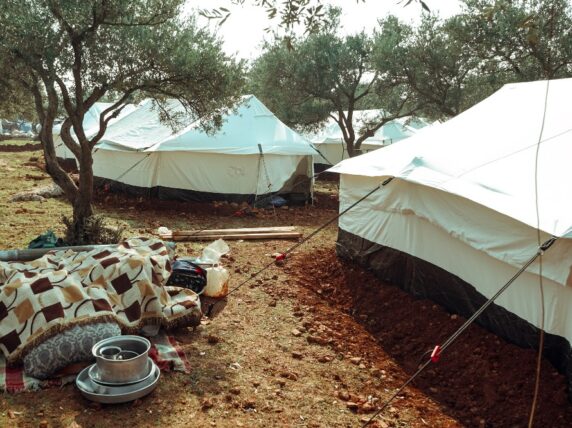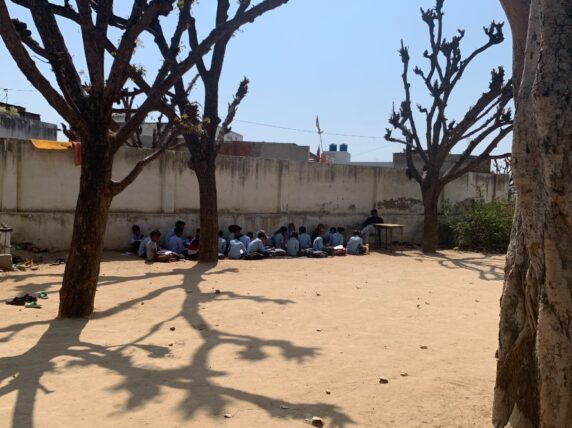Five ways the UK government and NGOs can support local leadership in response to the Ukraine crisis
As the British government and INGOs scale-up their humanitarian efforts in Ukraine, now is the right time to ask what a responsible approach would look like in terms of reinforcing the local response.
Every day the British public sees reports from the frontline. In besieged areas and neighbouring countries, it is the local government and community organisations, including volunteers often linked to the church, that deliver the vast majority of aid.
At the time of writing this, one of our partners continued to get aid into Kharkiv through its network of local faith groups and volunteers, whilst other larger humanitarian organisations seeking access for big convoys have been blocked from entering for days. A homeless shelter and soup kitchen our partner is supporting is now also distributing food with the long-term homeless mobilising to get help to the newly homeless.
I asked the director of Caritas Ukraine, another national faith-based NGO working across the country including in the most hard-to-reach areas, what her message to donors and international agencies would be and her first response was: “Don’t disrupt the fabric of civil society, find ways to reinforce it.”
Local groups and aid workers are exhausted and international support to them would be welcome, but it must be configured to complement and support local government and civil society, not undermine them or poach their staff.
Based on conversations with her and other local partners, here are five potential priorities that the British government and INGOs should be factoring into their response from the outset:
1. Direct funds to local organisations
For reasons of scale and to cut administrative costs, the Foreign Commonwealth and Development Office (FCDO) has increasingly directed its humanitarian funding through the UN over recent years. Signing big cheques to UN agencies and big organisations is easier than managing grants to lots of NGOs.
Yet the bureaucratic parameters within which UN agencies operate mean that they are not well suited to partnering with community groups and voluntary networks. The FCDO is supporting the DEC appeal, which is getting funds to local NGOs. But it should also allocate funds directly to the emergency appeals that local NGOs have established and find ways to directly fund networks and platforms of local NGOs.
2. Encourage other donors and intermediary agencies, such as the UN and INGOs, to be flexible with funding and overheads to support local NGOs
A top priority that CAFOD’s local partners highlight is the importance of flexibility by sector, geographic location and timeframe for programming. Local partners also highlight the varying approach international agencies take when it comes to supporting their overheads costs. They welcome how UN agencies have provided them with basic goods to transport and distribute through their community networks, but highlight that to sustain themselves, they also need support for their core running costs which has so far come from their own resources and their INGO partners.
3. Configure any international agency scale-up to reinforce, not poach from, local NGO and government capacities
The surge in global funding to the Ukraine response may encourage international agencies to grow their own infrastructure, which could involve hiring local staff. This risks taking expertise away from local organisations. The better option would be to deploy staff to Ukraine who bring expertise in supporting local organisations to strengthen their own capacity to meet humanitarian needs.
Subscribe to our newsletter
Our weekly email newsletter, Network News, is an indispensable weekly digest of the latest updates on funding, jobs, resources, news and learning opportunities in the international development sector.
Get Network NewsTo support local organisations effectively in Ukraine, Ukrainian and Russian language skills are essential. And to enable cooperation between local NGOs in Ukraine and partners in neighbouring countries, diplomatic support is needed to ensure male staff of local NGOs are allowed cross borders without being put under pressure to conscript.
4. Establish coordination processes which enable roles of local NGOs and host government authorities
CAFOD’s partner Caritas Ukraine has pointed to recent good practices in the east of Ukraine which could and should be built on. They appreciated the shift since 2018 towards a more effective and deliberate approach to bringing local NGOs into programmatic collaboration and the support provided for capacity -strengthening.
Partners also highlight the importance of reinforcing existing local coordination structures, such as the Oblast (province level) administration, which leads on internally displaced person (IDP)registration and coordination of services, which are well-organised and digitised. International coordination actors also need to develop more proactive and flexible methods for gathering information to minimise the burden on local actors.
5. Establish localisation metrics and track learning against these for all international ‘intermediary’ agencies channelling UK funding to local organisations
Despite all the rhetoric about ‘localisation’, most donors, UN agencies and INGOs are notoriously untransparent about how they support local actors. In 2020 the FCDO published NGO Humanitarian Funding Guidelines which for the first time established two basic requirements: [a] INGOs should cascade equal or greater overheads to local partners, and [b] INGOs should report on the level of funding to local partners. Yet since these guidelines were launched, UK embassies are still not routinely implementing them.
There is even less clarity on if or how the FCDO holds UN agencies accountable for localisation. UK INGOs have also made slow progress on demonstrating how they are shifting power and resources to local NGO partners. In the Ukraine response, this must change. Beyond those basic metrics (overheads plus tracking funding), both UN agencies and INGOs should explain, track and report on how they reinforce and act in complementary ways to local actors. Local civil society partners should also be heard in that process, so their priorities and their feedback inform the learning and assessment of international agencies.
Over recent years, British government ministers, FCDO officials and UK INGO leaders have joined various debates on localisation. The Ukraine crisis is an opportunity to put all the rhetoric and critical reflection into practice. Perhaps like never before, members of the general public, the media and politicians see and understand the actions of local institutions as essential to save lives and protect the dignity of people caught up in a horrific situation. Decisions made over the coming weeks and months by the British government and INGOs will determine what this looks like in practice in Ukraine, and what lessons can be drawn from that.




